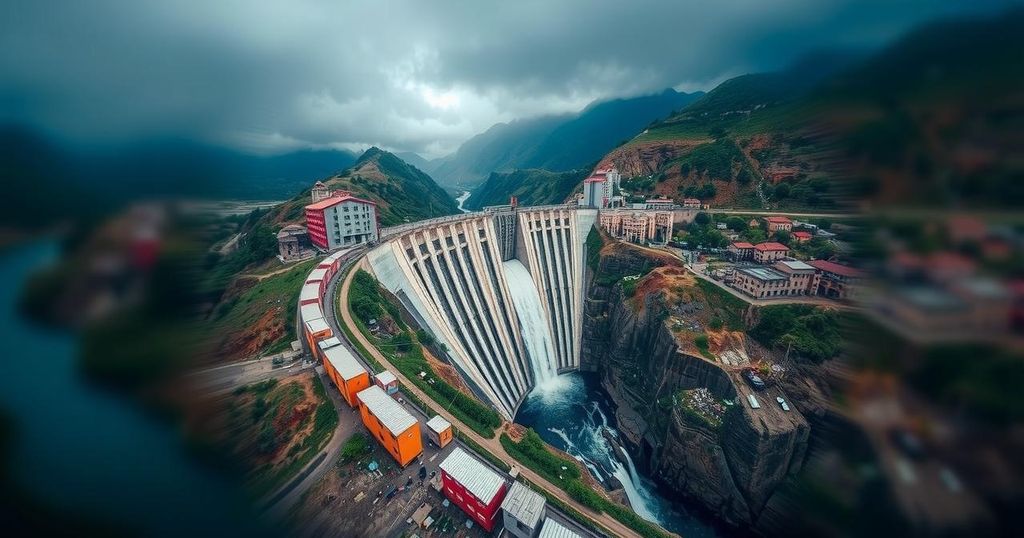Ethiopia’s Earthquake Concerns: Expert Raises Alarms Over GERD Safety
Ethiopia experienced a third earthquake at a magnitude of 4.7, approximately 570 km from the Grand Ethiopian Renaissance Dam (GERD). This event is part of an alarming trend, with 16 earthquakes in the past five weeks and 31 in total for 2023. Expert Abbas Sharaqi raises concerns about the dam’s safety due to its increased storage capacity amidst heightened seismic activity in the region.
On Sunday, Ethiopia was struck by a third earthquake that registered a magnitude of 4.7 and occurred at a depth of 10 kilometers. This seismic event transpired approximately 570 kilometers from the Grand Ethiopian Renaissance Dam (GERD) and about 400 kilometers from the lake’s eastern border. According to Abbas Sharaqi, a professor of geology and water resources at Cairo University, this earthquake marks the 16th such occurrence in the past five weeks, contributing to a total of 31 seismic events in the region this year, with magnitudes ranging between 4 and 5 degrees. In 2023, Ethiopia has experienced 38 earthquakes, with the highest magnitude recorded at 5.6 degrees. Historically, from 2014 to 2020, the average number of earthquakes exceeding four degrees was recorded at 5.3 annually. Sharaqi emphasized the unexpected increase in seismic activity, particularly in recent weeks, stressing the importance of close monitoring of the GERD and its surrounding lake, which spans over 200 kilometers in length. While Sharaqi indicated that an earthquake of magnitude five occurring far from the GERD currently poses no immediate danger, he warned that a more powerful quake closer to the dam—now holding approximately 60 billion cubic meters of water—could have serious repercussions. He further elaborated on the dam’s specifications, noting that the original United States plan intended for a reservoir capacity of just 11.1 billion cubic meters; however, the Ethiopian government significantly elevated this figure, raising alarms regarding potential risks. Ethiopia’s recent seismic activity continued when two additional earthquakes, both registering a magnitude of 4.6, struck on Saturday night. These quakes, occurring within a few hours of each other, were recorded at depths of 12.2 kilometers and 10 kilometers, making them the tenth and eleventh seismic events within the past five weeks. The sequence of earthquakes began on September 27 with a magnitude of 4.5, followed by several tremors within the 4.5 to five-degree range, which are all part of the ongoing seismic activity within the Ethiopian Rift Valley, still approximately 570 kilometers from the GERD.
The current seismic events in Ethiopia have raised considerable concerns about the safety of the Grand Ethiopian Renaissance Dam (GERD), which is a critical infrastructure project for the nation. With a significant increase in earthquake frequency, particularly in the last month, experts like Abbas Sharaqi have highlighted the urgent need for monitoring the geological stability of the area surrounding the dam. The GERD is designed to store water for irrigation and hydroelectric power, but its currently increased capacity has led to major safety considerations given the recent seismic activity. The geographical context shows that the dam and the associated tectonic risks may pose a threat to both regional stability and water management efforts in the larger East African region.
In summary, Ethiopia has recently experienced a notable increase in seismic activity, with the latest earthquake marking the 16th in five weeks, raising concerns over the safety of the Grand Ethiopian Renaissance Dam. Experts are urging heightened monitoring of the dam, which has an elevated storage capacity that could amplify risks in the event of stronger earthquakes occurring closer to the structure. With 31 earthquakes recorded this year alone, the potential consequences for both the dam’s integrity and regional stability warrant serious attention.
Original Source: ozarab.media




Post Comment